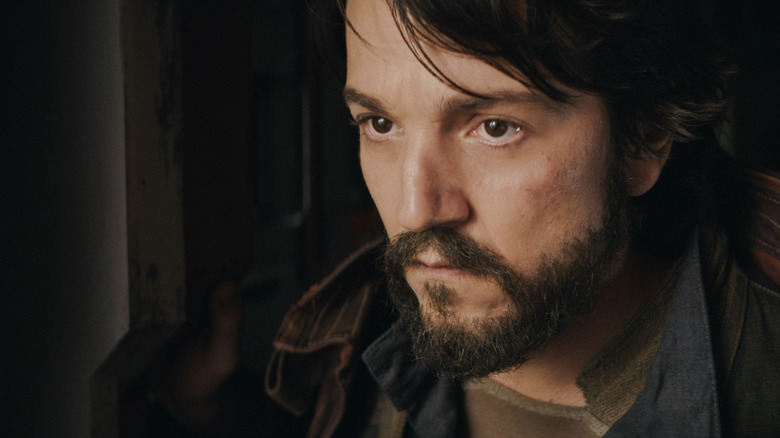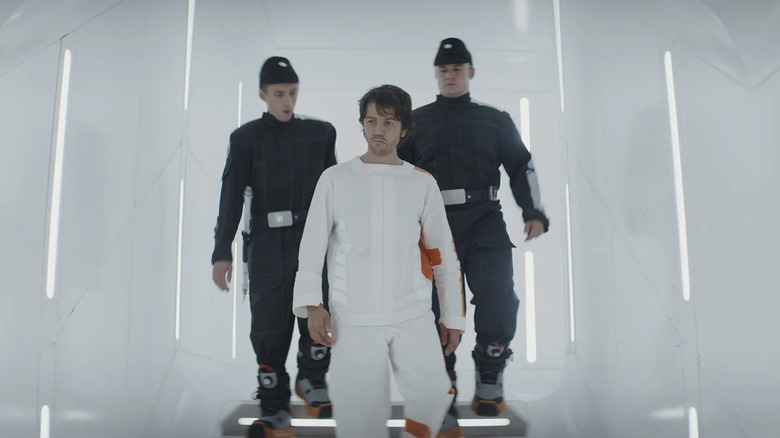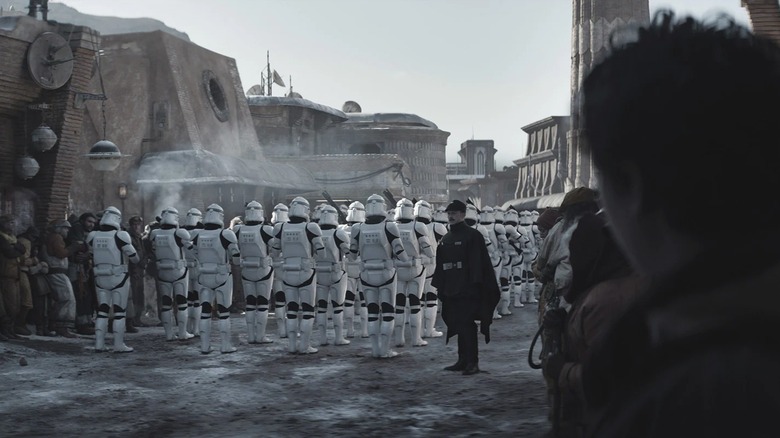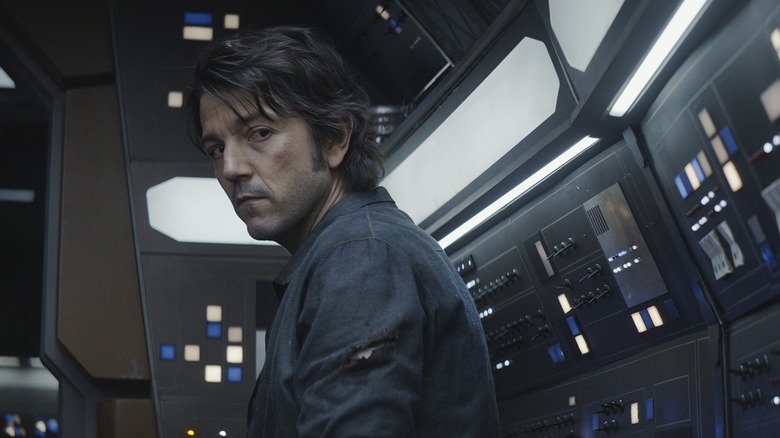Diego Luna Loves How The Patience And Specificity Of Andor Makes It Resonate Across Generations [Exclusive]
As the first season of "Andor" approaches its last act, the show has proven to be one of the most unique entries in the "Star Wars" franchise to date. Refreshingly, it's moved "Star Wars" away from its self-referential habits and embraced a fresh tone that paints a darker, more mature portrait of the galaxy. Showrunner Tony Gilroy has fashioned an exciting new vision of "Star Wars" that has allowed it to be far more radical and explicit in its depiction of fascistic oppression than ever before.
Telling a story that doesn't involve Jedi and lightsabers, "Andor" explores the beginnings of the Rebel Alliance and what life under the Imperial occupation is like for the little people who aren't powerful enough to shape the galaxy with a wave of their hands. "Star Wars" has always had its roots in political allegory, but "Andor" has truly taken the universe's anti-fascist themes to deeper and smarter places.
This week, /Film's Ethan Anderton had the pleasure of speaking with Diego Luna, producer and star of "Andor," about the show's political themes. In doing so, Luna praised "Andor" for its specificity and narrative patience, stating that it paints a portrait of oppression and rebellion that will remain relevant for generations to come.
Luna believes Andor will stay relevant
"Andor" has been a long time coming. The show was first announced in November 2018, two years after "Rogue One: A Star Wars Story" introduced Cassian Andor to audiences. Though he was a popular character, it has taken six years for Luna to embody Cassian on-screen once again. When asked if there was ever a point where it felt right to tell Cassian's story, especially given how the political environment has drastically changed since 2016, Luna admitted that it always felt necessary:
"I think from the beginning, man, because it doesn't seem to just to talk about today, even though there are references that definitely resonate and specific things in the story that you go like, "S***, my God, this galaxy far, far away has everything to do with the place I live in."
One of the most noteworthy arcs on "Andor" so far has Cassian being arrested and sent to an Imperial labor prison on Narkina 5. It's one of the bleakest settings "Star Wars" has ever shown us and one that parallels the prison industrial complex in real life all too well. Meanwhile, from Senator Mon Mothma's perspective, we're shown the Galactic Senate's refusal to take any action or hard stances against the rise of Imperial fascism. Their complacency has more than a little in common with our own modern political leaders in the U.S.
Yes, our current world's struggles are very much reflected in "Andor," although Luna argued that its portrait of oppression relates to more than just the present-day:
"I don't think they necessarily belong to today or yesterday. This is relevant because we tend to fall into the same kind of pattern."
Andor shows us what regular people are capable of
Luna continued:
"I think Tony [Gilroy] was very smart in deciding how he was going to represent oppression, which is half of what the show is about. It's about understanding the awakening of a revolutionary and the building of a rebellion. You have to understand what they're reacting to. He's been very, very meticulous in telling the story of what that is precisely."
Cassian in "Andor" is a far cry from the Cassian we meet in "Rogue One." He starts off as a disillusioned, self-serving man. Though he hates the corruption of the Imperial Empire, he is not interested in being part of a larger movement. Throughout the first season of "Andor," we' watch as Cassian slowly becomes radicalized by the suffering he both observes and experiences. By the time he's imprisoned on Narkina 5, he's even begun to inspire others to rise up with him. Cassian's evolution has been a gradual process, but it's been rewarding to see him find something to believe in.
"I think that is what makes the show very rich, that the specific matters a lot, that we do see the big events, we witness the big events, but we get ready for that," Luna said. "That patience is one thing I really like. I think it's important, because it reminds us what we regular people are capable of."
Luna hopes Andor inspires people to take action
The issue people have with prequel stories like "Andor" is that we know their characters' endpoints going in. Therefore, it's hard to stay invested when we know that Cassian Andor won't die until the end of "Rogue One." This is something Tony Gilroy fundamentally disagrees with, and "Andor" is all the better for it. There's a lot of value in seeing a character transform, and in the case of "Andor," it gives the moments of hopelessness some light and nuance.
We're seeing Cassian suffer great atrocities right now, but we know he will grow to be one of the important faces of the Rebellion and help set the events of "Star Wars: A New Hope" into motion. In a world previously defined by "chosen ones," "Andor" tells a story where individuals take action to change their own fates.
"That's not just important today because of what you and I are living through," said Luna. "It was important 10 years ago and five years ago, and it'll be important in another five years. To me, clearly, there's a lot of work to be done in the world that you and I live in, and it's just going to happen if we get involved. So in a way, this show is pertinent. It's always pertinent."
New episodes of "Andor" premiere on Wednesdays on Disney+.



